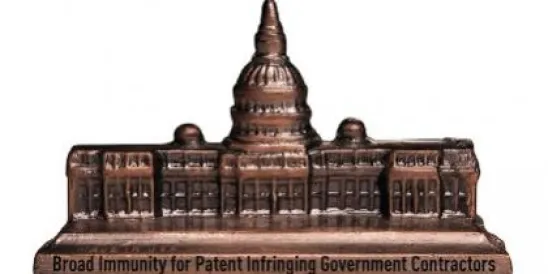A March 14, 2012, decision of the Federal Circuit sitting en banc, Zoltek Corporation v. United States v. Lockheed Martin, confirmed the broad immunity that government contractors enjoy from claims of patent infringement during the performance of federal contracts. The en banc court did so by reinstating a patent holder’s infringement claim for damages against the United States and holding that contractor immunity applies whenever the government may be liable for infringement. The Zoltek case, which nears the end of a 16-year legal battle, should be of great interest to any U.S. Government contractor that deals with intellectual property issues in the course of its contracting work.
In Zoltek, the Federal Circuit confirmed that 28 U.S.C. § 1498(a) allows a patent holder to sue for damages against the Government “[w]henever an invention described in and covered by a patent of the United States is used or manufactured by or for the United States without license of the owner thereof or lawful right.” The Federal Circuit also reaffirmed that when the U.S. Government is subject to suit under § 1498(a) for alleged infringement patent infringement by one of its contractors, that contractor is by law rendered immune from individual liability for the alleged infringement.1
The Federal Circuit underscored the importance of avoiding “the possibility that the United States’ procurement of important military matériel could be interrupted via infringement actions against government contractors.” The court cited the Richmond Screw Anchor Co. case, in which the Supreme Court held that 28 U.S.C. § 1498 was intended to “relieve the contractor entirely from liability of every kind for the infringement of patents in manufacturing anything for the government” in order “to stimulate contractors to furnish what was needed for the war, without fear of becoming liable themselves for infringements.” Richmond Screw Anchor Co. v. United States, 275 U.S. 331, 343-44 (1928).
The Zoltek case originated in 1996 when Zoltek brought an action in the Court of Federal Claims against the government under § 1498 (Zoltek I), alleging that Lockheed Martin, a U.S. Government contractor, had used a Zoltek-owned patented process in Japan to manufacture products that were subsequently imported into the United States. The U.S. Government moved for summary judgment, arguing that Zoltek was barred from recovery by 28 U.S.C. § 1498(c), which states that the remedies provided for under 28 U.S.C. § 1498 apply to claims “arising in a foreign country.”
In 2003, the trial court stayed the U.S. Government’s summary judgment motion pending additional briefing regarding Zoltek’s ability to assert a claim for a taking of its patent rights under the Fifth Amendment (Zoltek II). The trial court subsequently held that Zoltek’s statutory claim was barred by 28 U.S.C. § 1498(c), but it could assert a takings claim. Both parties then appealed to the Federal Circuit.
In a confusing 2006 per curiam decision, with Senior Judge Plager dissenting and each Judge in the panel majority writing a concurring opinion expressing a different rationale, the Federal Circuit (in Zoltek III) affirmed that Zoltek could not proceed on its statutory claim under 28 U.S.C. § 1498, although on different grounds than the trial court, and denied that Zoltek could bring a Fifth Amendment takings claim. The per curiam opinion determined that there could be no claim under § 1498 where not all steps of a patented process had been performed within the United States. The court acknowledged that on identical facts an infringement claim would lie against a private party under 35 U.S.C. § 271(g), but explained that on these particular facts, there was a mismatch between §271(g) and § 1498.
On remand in 2009, Zoltek added a claim directly against Lockheed Martin, the government’s contractor, for patent infringement. It reasoned that if 28 U.S.C. § 1498 was inapplicable for purposes of allowing an infringement claim against the government, then it also should be inapplicable for purposes of conferring infringement immunity on Lockheed Martin, the contractor. The Court of Federal Claims agreed, concluding that “section 1498(a) only insulates government contractors from suit when the Government can be found liable.” Agreeing with the 2006 Federal Circuit panel decision, the Court of Federal Claims noted that Zoltek had discovered “a legislative gap between the definition of infringement under (28 U.S.C. § 1498) and the definition of infringement under (35 U.S.C. § 271).” The Court of Federal Claims thus granted Zoltek’s motion to amend the complaint to add Lockheed Martin as a defendant and certified to the Federal Circuit the legal question “whether 28 U.S.C. § 1498(c) must be construed to nullify any government contractor immunity provided in §1498(a) when a patent infringement claim aris[es] in a foreign country.”
The Federal Circuit’s recent en banc decision reversed and vacated the 2006 per curiam panel decision. It reinstated Zoltek’s infringement claim against the United States and preserved the immunity of the U.S. Government contractor, Lockheed Martin - thus upholding the broad general principle that the scope of a contractor’s immunity from infringement liability is identical to the scope of the patent holder’s claim under 28 U.S. C. 1498. The en banc Federal Circuit also reversed the 2006 panel ruling that the United States cannot be liable on a takings theory in a patent case. The court made clear that its decision was necessary in order to avoid either of two unwelcome policy outcomes:
In confronting the question of whether a contractor acting under Government authority could be held liable for patent infringement, in a situation in which we had previously held the Government not liable for the allegedly infringing actions of its contractor, we realized that one of two consequences would result. Either we had to conclude that a patentee’s well-pleaded complaint of infringement in the United States of a United States patent in these circumstances fails to state a cause of action against both the Government and the Government’s contractor, or we would have to override the long-standing understanding of the statutory framework that a contractor working for the Government is immune from individual liability for patent infringement occurring in the course of conducting the Government’s contract.
The court then explained that this dilemma caused the court to “to re-examine the premises on which our earlier opinion in Zoltek III was based, and to reconsider the consequences of that opinion.” The court concluded that “the change in law effected by this court’s decision in Zoltek III, which limited the scope of § 1498(a) to direct infringement under § 271(a), is in error, and must be corrected.”
Greenberg Traurig submitted an amicus curiae brief in the latest round of the Zoltek case that the en banc Federal Circuit cited and stated it agreed with on the key issue of statutory construction of § 1498.
The Zoltek decision represents a landmark in the development of contractor immunity from patent infringement claims. Even so, § 1498 claims against the U.S. Government still differ from ordinary patent infringement claims in myriad ways. As the convoluted history of the Zoltek case demonstrates, analysis and resolution of issues that arise under § 1498 can differ - often dramatically - from the analysis and resolution of comparable patent law issues outside the government contract realm under Title 35.
1The patent indemnity clause of FAR 52.227-3 requires a contractor to reimburse the U.S. Government for liabilities resulting from actions under 28 U.S.C. § 1498. Thus, while contractors may be immune from suits and injunctions in performing government work (assuming they properly assert this affirmative defense), the terms and conditions of their contracts will determine whether they may ultimately be liable.




 />i
/>i

